Click To Call > (800) 966-7673
When it comes to pest control, prevention is always less expensive and less time-consuming than trying to treat an infestation after it happens. By practicing these simple, common-sense pest prevention tips, you should be able to significantly reduce the risk of infestations of the most common types of pests like ants, cockroaches, spiders, and rodents.
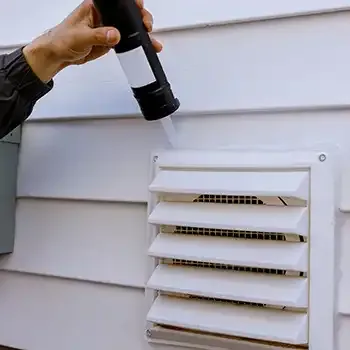 Screen vents, ensure doors are tight-fitting with functional sweeps, and seal gaps around windows, doors, pipes, and utility lines enter through the wall. These are common places that pests enter, as well as, great ways to reduce heating/cooling bills!
Screen vents, ensure doors are tight-fitting with functional sweeps, and seal gaps around windows, doors, pipes, and utility lines enter through the wall. These are common places that pests enter, as well as, great ways to reduce heating/cooling bills!
Protects against: Ants, Earwigs, Rodents, Stink Bugs, Spiders and Wasps
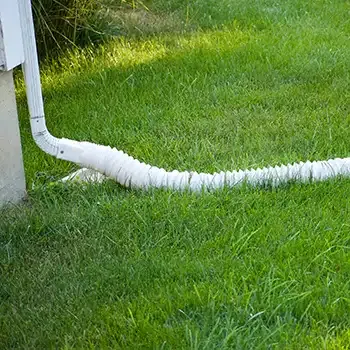 Pools, bird baths, and fountains can bring a lot of enjoyment, but may also bring a lot of pests if they aren’t maintained. Check rain gutters during a storm to ensure they are properly draining water away from the structure.
Pools, bird baths, and fountains can bring a lot of enjoyment, but may also bring a lot of pests if they aren’t maintained. Check rain gutters during a storm to ensure they are properly draining water away from the structure.
Protects against: Ants, Earwigs, Mosquitoes, Spiders, Termites and Springtails
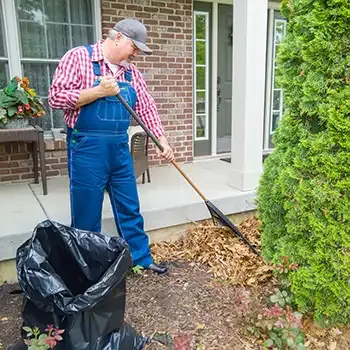 Mulch and leaf litter trap moisture and attract termites. Mulch is great for nurturing plant root growth, but can be problematic when next to the foundation. Thick ground covers like Pachysandra and creeping vines also provide pest harborage and may make it easier for some species to invade.
Mulch and leaf litter trap moisture and attract termites. Mulch is great for nurturing plant root growth, but can be problematic when next to the foundation. Thick ground covers like Pachysandra and creeping vines also provide pest harborage and may make it easier for some species to invade.
Protects against: Ants, Earwigs, Rodents, Spiders, Termites and Springtails
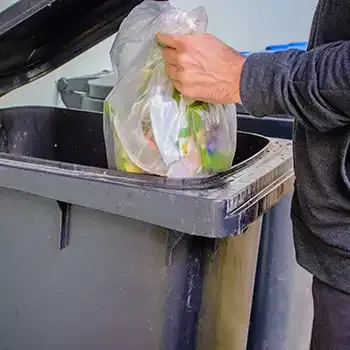 Metal cans with tight-fitting lids deter pests. Locking straps can also be used to make it hard for wildlife, like raccoons, to open the lids. Spillage should be periodically washed out to minimize attractiveness to insects and other pests.
Metal cans with tight-fitting lids deter pests. Locking straps can also be used to make it hard for wildlife, like raccoons, to open the lids. Spillage should be periodically washed out to minimize attractiveness to insects and other pests.
Protects against: Flies, Wildlife, Rodents and Wasps
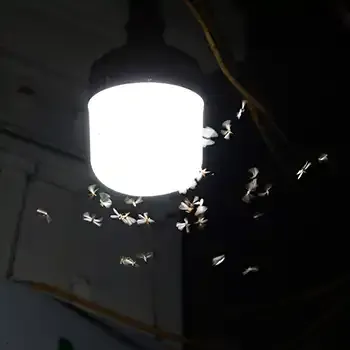 Change bulbs to a yellow or warmer color spectrum, use motion sensors instead of leaving them on constantly, angle light fixtures downward, or install fixtures with covers to reduce light shining outward.
Change bulbs to a yellow or warmer color spectrum, use motion sensors instead of leaving them on constantly, angle light fixtures downward, or install fixtures with covers to reduce light shining outward.
Protects against: Cockroaches, Moths, Rodents, Stink Bugs and Spiders
Integrated Pest Management (IPM) is an environmentally friendly approach to pest control focusing on prevention rather than the routine application of pesticides.
Proper pest identification:
IPM focuses on prevention by removing conditions that attract pests, such as food, water, and shelter. Preventive actions include:
Pest control is required if prevention is ineffective. IPM programs use the most effective, lowest risk options considering the risks to the applicator, building occupants, and environment. Control methods include:

The Rose Home Service Program offers regularly scheduled pest control services for a single annual price, designed to identify and prevent infestations of the most common pests. Whether you're dealing with ants, spiders, or other common invaders, our Home Service Programs provide year-round protection and peace of mind.